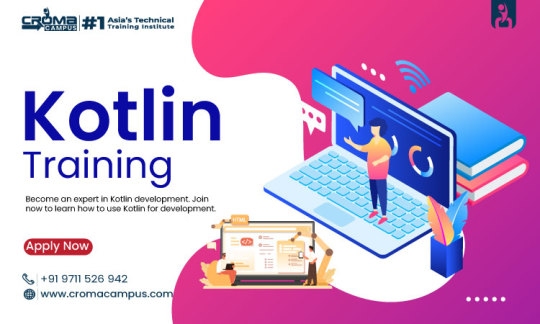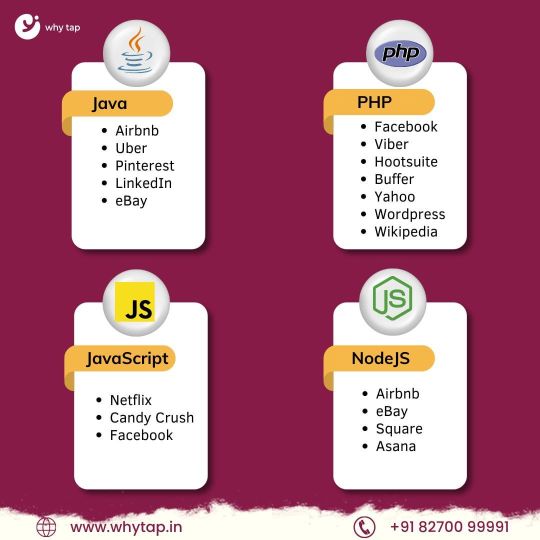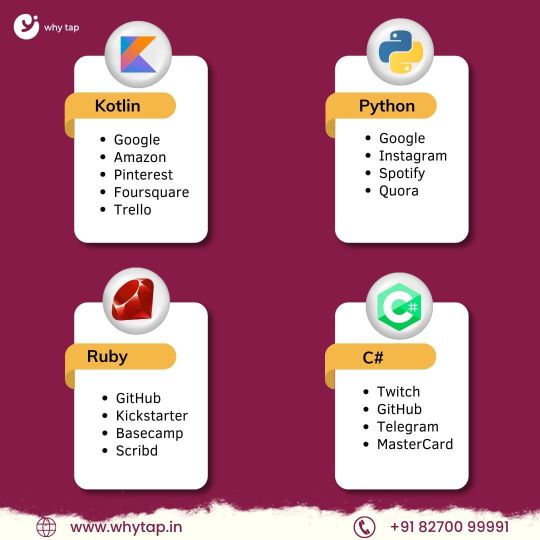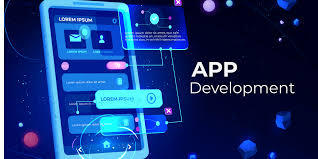#kotlin training
Explore tagged Tumblr posts
Text

Kotlin has become the go-to language for Android development, offering features like null safety, extension functions, and coroutines that streamline coding and enhance app performance. To master these powerful tools, consider enrolling in SkillIQ's comprehensive Android Kotlin course. Our expert instructors will guide you through hands-on training, ensuring you gain the skills.
#Kotlin Android#Kotlin Training#Kotlin Course#Kotlin Training in Ahmedabad#Android Development Course#and Android Kotlin Course Training
0 notes
Text
Kotlin Training in Delhi
Croma Campus is the finest place to start your career at the Kotlin Training in Delhi. We will lead you through the fundamentals of Kotlin before you delve into variables, classes, functions, OOP ideas, collections, and so on.

0 notes
Text




WHYtap
#placement#training#webdevelopment#programming#coding#backend development#backend#kotlin#python#ruby.txt#c++ language#java#javascript#nodejs
7 notes
·
View notes
Text
Are you seeking a job and want to improve your IT skills to increase your chances of getting hired?
IT skills development courses can significantly enhance employability in today's competitive job market. Here are some essential courses to consider:
1. Programming Languages: Learn popular programming languages like Python, Java, JavaScript, or C++. These languages are widely used across industries and are in high demand by employers.
2. Web Development: Acquire HTML, CSS, and JavaScript skills to create interactive and responsive websites. Understanding web development fundamentals opens up web design, front-end development, and UX/UI opportunities.
3. Database Management: Gain proficiency in database management systems like SQL and NoSQL. Database skills are crucial for roles in data analysis, data science, and backend development.
4. IT Project Management: Effective project management skills are essential for overseeing IT projects from start to finish. Courses covering project management methodologies such as Agile or Scrum, along with tools like Jira or Microsoft Project, can help you become a competent IT project manager.
Enrolling in IT skill development courses can help you improve your knowledge and proficiency in areas where employers place high value. Remember to showcase your newly acquired skills on your resume and LinkedIn profile to attract potential employers.
For comprehensive IT training courses, consider AnA Academy. With a strong reputation for excellence and an industry-relevant curriculum, AnA Academy provides the perfect environment for refining your IT skills and advancing your career prospects.
#computer academy#Best Computer Institute#IT Training Institute#Computer Centre#Best Software training institute#Computer Training Institute#it professional course#it training course#mobile app developer course#mobile app development course#web developer course#web development course#android course#java course#kotlin course#ios course#swift course#flutter course#reactnative course#php course#laravel course#mern stack developer course
1 note
·
View note
Link
#kotlin training in jalandhar#asp net training in jalandhar#laravel training in jalandhar#angular training in jalandhar#react training in jalandhar
0 notes
Text
Updates: I was self-sabotaging and in the end I almost missed two good opportunities.

How are you? I hope well.
I've had more instabilities in the last few days (if you follow me around here, you already know that this seems to be routine HEHUEHEH)
But things are improving and I've set some goals that have helped me feel more confident about where to go next.
Now I wanted to share news, what I learned in this process and what I will share from now on.
The prints above are from processes/scholarships that I was accepted.
The first is the Big data Engineer training proposed by a startup in the state where I live.
The second is training focused on the front-end (from Html to React.js and other soft skills)
The second one I applied for in February and I didn't even expect to be accepted, I took a simple question test and sent it on. This month I received acceptance and I was like "look how cool, I think I can learn well and the bank that sponsors it is famous in my country, so it will be nice to have it on my resume".
This is just a training, no possibility of hiring.
The first is precisely the point of self sabotage that I want to talk about.
Everything involving Data/AI is complex and a hell of a responsibility for me, so it's for everyone, but you have to put in a lot of effort. First I did the test there was SQL (I DIDN'T EVEN KNOW ANYTHING UHEUHEUE, Only with google searches and logic I got it) . And then there were issues with Matrix and Vectors AND I HAVE NEVER BEEN SO GRATEFUL TO NOVEMBER/DECEMBER BEA.
Thanks to all those exercises I managed to do (I just don't know how many I got right and how many I got wrong).
BUT here comes the self-sabotage I applied or signed up for this vacancy more than 3 times (the good and bad thing is that the platform kept the test, so it was only the first one I took) I was ALWAYS like: "I won't make it." "It's going to be too long for me", "I don't even have a background in math (they don't ask for math as a requirement, just a language and sql)", "I won't be approved", " I'm horrible at logic, even if I pass it will go wrong."
And so this week, before they reveal who passed, I wrote to myself again, with the feeling of "Whatever happens and that's it".
The result was yesterday but as nothing appeared in my email I thought,"I didn't pass and it's ok, let's continue with java"
-Yes, I started Java because I signed up for a Kotlin bootcamp sponsored by a good company. The best of this bootcamp could participate in their selection process. They don't pay well, but it would be enough to keep me going, so I just went.-
When I saw the notification in the email today I was in shock for many minutes, before and after HUEUEHUUE. "Did I really pass?"
In this program you can also have access to participate in the company's selection process. But no guarantee 100% work at the end.
I will try to focus more on the issue of doing my best in training and having it on my curriculum. (Strategy to regulate my anxiety). I want to work there, but I don't control the future, so I'll just focus on doing my best.
And this is where I wanted to encourage anyone reading this to try even if they don't think they can.
If I hadn't written myself again for the 4th time this week I wouldn't be in this training that will be good for my CV since I want to go to Artificial Intelligence.
Is afraid? Go scared! You can cross good doors and achieve things you never imagined. So for your future and also past versions, always try to believe or pretend to believe in yourself.I'm still trying, believe me
NOW WHAT WILL I POST?
I will post my routine with each of the classes.
First I'll need to level up my Python and SQL. So even though the big data training starts this week (it will be every day) the first week along with that I'm finishing that python course and practicing SQL.
While Big data will be every day from 19:00 2 hours each class, but I don't know how many classes a day yet. The Front-end are recorded classes and only 1 day a week we have live meetings and I'll probably have to reconcile both, but that's a problem for the future UHEHUEUE.
Maybe I'll separate it into 2 posts so I don't get so confused since they are different things.
I'm excited and wish those of you who are reading and trying to learn code to get good learning opportunities or jobs in the midst of everything that's going on.
Drink water and have a great weekend.
#bigdata#data science#woman in stem#womanintech#try even scared#studyspiration#software engineering#computer science#computing#code#computers#software engineer#artificial intelligence#game code#100 days of code#codeblr#learning#study community#studystudystudy#study with me#html css#javascript#reactjs#python#pythonprogramming#sqldeveloper#sql
30 notes
·
View notes
Text
Scope Computers
🚀 Mobile App Development Training
Unlock your potential to build amazing mobile apps! 📱 Learn to create for Android and iOS using the latest tools like Java, Kotlin, Swift, and Flutter. 💻 Get hands-on experience with real projects and expert guidance. 🎨
🔥 Enroll now and start your journey as a mobile app developer!

#scopecomputers#mobileappdevelopment#mobileapptraining#appdev#appbuilding#appcoding#techskills#onlinelearning#mobiletechnology#digitalskills#softwareengineering#mobiledevelopment#codingcourse#techcareer#mobileprofessional#mobileindustry
0 notes
Text

App Development Course in Chandigarh
Master App Development with the Best Course in Chandigarh
1. Why Choose an App Development Course in Chandigarh?
Chandigarh is emerging as a tech hub, offering exceptional opportunities for aspiring developers. With growing demand for mobile applications, a structured course can help you build a solid foundation in app development.
2. Learn from Industry Experts
Top institutes in Chandigarh offer training by industry professionals, ensuring you learn the latest trends and technologies in mobile app development.
3. Master Android & iOS Development
Whether you aim to build Android or iOS apps, the course covers both platforms, teaching you programming languages like Java, Kotlin, Swift, and Flutter.
4. Hands-on Projects for Real-World Experience
Gain practical experience by working on live projects. From UI/UX design to backend development, you will learn everything needed to launch your own mobile app.
5. Who Can Join This Course?
Whether you’re a beginner, student, or working professional, this course is designed to help anyone kickstart their app development journey.
6. Career Opportunities After the Course
After completing the course, you can work as a Mobile App Developer, UI/UX Designer, or even start your own app-based business.
7. Affordable Course Fees with Placement Assistance
Most institutes offer budget-friendly courses with placement support, helping you secure a high-paying job in top IT companies.
8. Learn Cutting-Edge Technologies
The course includes training in Firebase, React Native, API integration, and other trending technologies in app development.
9. Flexible Learning Options
Many institutes in Chandigarh offer both online and offline classes, making it easy for students to learn at their convenience.
10. Enroll Today & Build Your First Mobile App!
Take the first step towards a rewarding career in app development. Join the best app development course in Chandigarh and transform your ideas into reality!App Developmnet course https://adinfotechsolutions.com/app-development-course/
0 notes
Text
Android app development involves creating applications for devices running the Android operating system using languages like Java and Kotlin. It includes designing user interfaces, implementing functionalities, and optimizing performance. Developers use Android Studio and various APIs to build and test apps efficiently.
0 notes
Text
What programming skills will be in demand in the next 5 years?

The world of technology is developing so fast that it is hard to keep track of all the changes. Every year there are new programming languages, tools and approaches to development that change the usual standards of work. Programming remains one of the most in-demand fields as it is the basis for creating software products, artificial intelligence technologies and process automation. However, the skill requirements for programmers are constantly changing depending on trends and business needs. What programming skills will be in demand in the next 5 years and how to prepare for it? We will break down the main trends and skills that will help you stay in demand in the IT sphere.
Artificial Intelligence and Machine Learning
Artificial intelligence and machine learning are already playing a huge role in technology. They will become even more significant in the coming years. To stay on top of these changes it is important to learn programming languages such as Python and R. You also need to understand the basics of mathematical statistics and machine learning algorithms. Professionals in this field develop systems that automate complex processes, make predictions, and improve user interaction.
Working with big data
The amount of data in the world is growing at an incredible rate. Companies are looking for specialists who know how to work with big data. This includes the ability to collect, analyze, and visualize information. Languages like SQL, Python, and Java are considered essential tools for working with data. It is also important to learn platforms like Apache, Hadoop, and Spark.
Software Development
Classical software development is not losing its relevance. Programming skills in Java, C++ and C# remain in demand due to their application in creating complex systems. Languages such as Rust and Go, which provide security and high performance, are also gaining popularity. It is important not only to be able to write code but also to know the basic development methodologies, such as Agile and DevOps. These approaches help to effectively manage projects and produce quality products.

Web application development
Websites and web applications remain a key element of any company. HTML, CSS and JavaScript skills will be in demand for years to come. It's also important to learn modern frameworks such as React, Angular and Vue.js that speed up the development process. The server side of web applications also plays an important role. Knowledge of Node.js, Python or Ruby will come in handy here. The ability to create user-friendly and functional web solutions makes you a valuable specialist on the labor market.
Cybersecurity
With the increase in cyberattacks, cybersecurity is becoming a priority for many organizations. Skills in programming for data security will be highly valued. It is important for professionals to know languages such as Python and C and to be able to work with threat detection systems. Understanding the principles of encryption authentication and network security, will effectively protect user and company data. Investing in cybersecurity training will pay off in the near future.
Cloud technologies
Companies are increasingly adopting cloud technology to improve operational efficiency. This makes skills in cloud platforms such as AWS, Azure, and Google Cloud incredibly in demand. Programming in a cloud environment requires knowledge in automating processes. Understanding how to design robust and scalable systems helps developers stand out from the competition.
Mobile Application Development
Smartphones and tablets have become an integral part of our lives. This means that mobile app development skills will remain relevant in the coming years. For Android development, it is important to learn Java and Kotlin. For iOS, Swift and Objective-C are suitable. In addition, professionals should understand the basics of UX/UI design to create user-friendly and attractive apps.
Game development
The video game industry continues to grow rapidly. Skills in game engines such as Unity and Unreal Engine are a great choice for those who dream of working in game development. C++ and C# are often used to program games. 3D modeling and animation skills are also in demand. Working in the game industry requires creativity and knowledge of modern technologies.

Multi-platform technologies
The demand for multi-platform solutions continues to grow. This includes creating applications that run on multiple platforms such as Windows, macOS and Linux or Android and iOS. Tools such as Flutter and React Native allow you to develop applications with unified code for different systems. This greatly speeds up the development process and reduces costs. Skills with these technologies will be an important advantage in the coming years.
Process Automation
Companies are looking for ways to reduce costs and increase efficiency through automation. This makes programming skills in tools like Selenium or UiPath incredibly valuable. Knowledge of Python and JavaScript languages can help create scripts to automate everyday tasks. Understanding how to integrate automated systems into your existing infrastructure is important here.
Conclusion
In the field of programming, it is important to follow trends and constantly learn new things. Artificial intelligence, big data, cybersecurity, and cloud technology are key trends. Developing skills in these areas will help you stay competitive in the IT world. Don't be afraid to try new things, invest your time in self-development and it will pay off over time.
0 notes
Text
Top Kotlin Android Libraries Every Developer Should Use in 2024

In this world of Android development, leveraging the right libraries can significantly enhance productivity and the overall quality of your apps. As Kotlin continues to solidify its position as the preferred language for Android development, numerous libraries have emerged to simplify complex tasks and accelerate development processes. Here’s a look at the top Kotlin Android libraries every developer should use in 2024:
1. Kotlin Coroutines
Kotlin Coroutines have revolutionized asynchronous programming in Android, making it easier to manage background tasks and improve app performance. With coroutines, you can write clean, readable, and maintainable code for handling tasks like network requests, database operations, and animations without the complexity of callbacks or RxJava.
2. Jetpack Compose
Jetpack Compose is Google’s modern toolkit for building native UI. It simplifies UI development by using declarative programming and integrates seamlessly with Kotlin. Compose enables developers to create dynamic, responsive, and beautiful user interfaces with less code, significantly speeding up the development process.
3. Ktor
Ktor is a powerful asynchronous framework for building connected applications. Whether you need to make API calls, handle WebSocket connections, or serve as a backend server, Ktor's flexibility and Kotlin-first approach make it an excellent choice for networking in Android apps.
4. Room
Room is part of the Android Jetpack suite and provides an abstraction layer over SQLite, making database management more intuitive. With Room, you can create and manage your app’s database with ease, leveraging Kotlin’s syntax and features to ensure type-safety and efficiency in data operations.
5. Retrofit
Retrofit remains a staple for API interaction in Android apps. This type-safe HTTP client for Android and Java works seamlessly with Kotlin, allowing you to handle RESTful web services effortlessly. With features like built-in converters and support for coroutines, Retrofit simplifies network communication and data parsing.
6. Dagger/Hilt
Dependency Injection (DI) is crucial for creating modular, testable, and maintainable code. Dagger, along with Hilt (a newer, simplified DI framework built on Dagger), helps manage dependencies efficiently. Hilt's tight integration with Android and Kotlin reduces boilerplate code and facilitates easy dependency management.
7. Coil
Coil (Coroutine Image Loader) is an image loading library for Android that is optimized for Kotlin. It leverages Kotlin coroutines, making it lightweight, fast, and easy to use. Coil simplifies image loading and caching, ensuring smooth performance and minimal memory usage in your apps.
8. Moshi
Moshi is a modern JSON library for Android and Java that makes parsing JSON into Kotlin data classes straightforward. With built-in support for Kotlin and integration with Retrofit, Moshi handles serialization and deserialization efficiently, ensuring your app can process JSON data reliably.
9. Koin
Koin is a pragmatic, lightweight dependency injection framework for Kotlin developers. It is designed to be simple to set up and use, with a straightforward DSL to define dependencies. Koin’s ease of use and minimal setup make it an attractive choice for Kotlin-based Android projects.
10. Flow
Part of Kotlin’s coroutines library, Flow is designed for handling streams of data asynchronously. It is particularly useful for managing data that updates over time, such as live data streams from a database or network. Flow provides powerful operators to transform and handle data streams with ease.
Ready to master these libraries and elevate your Android development skills? Enroll in the "Android Development with Kotlin Course for Beginners" by SkillIQ today and take the first step towards becoming a proficient Android developer.
Staying updated with the latest libraries is essential for modern Android development. These Kotlin libraries not only streamline the development process but also enhance the performance and scalability of your applications.
Enroll now and take the next step toward a brighter future!
Contact us on: +91 7600 7800 67
Email us at: [email protected]
#Kotlin Android#Kotlin Training#Kotlin Course#Kotlin Training in Ahmedabad#Android Development Course#and Android Kotlin Course Training
0 notes
Text
Kotlin Training Institute in Noida
Croma Campus is the finest place to start your career at the Kotlin Training Institute in Noida. We will lead you through the fundamentals of Kotlin before you delve into variables, classes, functions, OOP ideas, collections, and so on.
0 notes
Text
Best Language for App Development to Consider in 2025
The world of app development is constantly evolving, with new programming languages, frameworks, and tools emerging to streamline the process. As we step into 2025, choosing the best language for app development is crucial for developers aiming to build efficient, scalable, and high-performing applications. Whether you are an aspiring developer or an experienced programmer, selecting the right programming language can significantly impact your success. In this blog, we will explore the top languages to consider for app development in 2025 and how you can master them through the best course and best training for app development.
1. Kotlin – The Future of Android Development
Kotlin has firmly established itself as the preferred language for Android development, and its popularity continues to grow in 2025. Google officially supports Kotlin for Android apps, making it a powerful choice for developers.
Why Choose Kotlin?
Concise and Expressive: Kotlin's syntax is more concise than Java, reducing boilerplate code.
Interoperability with Java: Developers can seamlessly integrate Kotlin with existing Java codebases.
Coroutines for Better Performance: Kotlin's built-in coroutines make handling asynchronous tasks easier and more efficient.
Officially Supported by Google: With Google's backing, Kotlin receives regular updates and improvements.
2. Swift – The Best Choice for iOS Development
For iOS app development, Swift remains the top programming language in 2025. Apple’s programming language is designed to provide better performance, safety, and ease of use compared to its predecessor, Objective-C.
Why Choose Swift?
Fast and Efficient: Swift is optimized for performance and runs much faster than Objective-C.
Safety First: The language eliminates many common programming errors, making development more secure.
Modern Syntax: Swift’s syntax is clean, readable, and easy to learn.
Seamless Integration with Apple’s Ecosystem: Swift works smoothly with Apple’s APIs and frameworks like SwiftUI and Combine.
3. Flutter (Dart) – The Best Framework for Cross-Platform Apps
Flutter, powered by Dart, is one of the most promising technologies for cross-platform app development in 2025. With a single codebase, developers can create visually stunning applications for both Android and iOS.
Why Choose Flutter?
Single Codebase for Multiple Platforms: Write once, deploy anywhere.
Rich UI with Widgets: Flutter’s widget-based UI system allows for highly customizable designs.
Fast Development with Hot Reload: Instantly view changes without restarting the app.
Growing Community and Support: Flutter is continuously evolving with strong community support.
4. React Native – JavaScript-Based Cross-Platform Development
React Native, developed by Facebook, is another top contender for cross-platform app development. It allows developers to build mobile apps using JavaScript and React.
Why Choose React Native?
Code Reusability: A large portion of the code can be reused across platforms.
Strong Community and Libraries: React Native has an extensive ecosystem of third-party libraries and tools.
Hot Reloading for Quick Development: See real-time changes without recompiling the entire app.
Backed by Facebook and Used by Major Companies: Apps like Instagram, Airbnb, and Walmart use React Native.
5. Python – A Rising Star in Mobile App Development
Although Python is primarily used for web development, machine learning, and data science, its role in mobile app development is expanding in 2025 with frameworks like Kivy and BeeWare.
Why Choose Python?
Easy to Learn and Use: Python has a simple and readable syntax, making it great for beginners.
Strong Community and Libraries: A vast number of libraries support various functionalities.
Growing Support for Mobile Development: Tools like Kivy and BeeWare enable mobile app development using Python.
Ideal for AI-Powered Apps: Python is the go-to language for AI and machine learning, making it perfect for intelligent applications.
6. C# – A Powerful Choice for Game and Enterprise Apps
C# remains a top choice for mobile game development (Unity) and enterprise applications in 2025. Its integration with Microsoft’s ecosystem makes it a solid choice for developers.
Why Choose C#?
Excellent for Game Development: C# is the primary language for Unity, the most popular game development engine.
Strong Support for Enterprise Apps: Many businesses use C# for enterprise solutions.
Cross-Platform Compatibility: Xamarin allows C# apps to run on both Android and iOS.
Robust and Scalable: Ideal for large-scale applications.
Conclusion
The best language for app development in 2025 depends on your goals, the platform you want to develop for, and the type of applications you aim to build. Kotlin and Swift remain the best choices for native Android and iOS development, respectively, while Flutter and React Native dominate cross-platform development. Python and C# are gaining traction for specialized applications like AI and game development.Regardless of the language you choose, enrolling in the best training for app development will accelerate your learning curve and increase your chances of building successful applications. Whether you prefer online or offline learning, finding the best course with industry experts, real-world projects, and certification can give you a competitive edge in the app development field.
0 notes
Text
App Development Course in Chandigarh
App Development Course in Chandigarh: Your Gateway to a Successful Tech Career
1. Introduction to App Development
In today's digital world, mobile applications have revolutionized businesses and daily life. Whether it's e-commerce, healthcare, education, or entertainment, mobile apps play a crucial role in every industry. Learning app development is a valuable skill, and Chandigarh is becoming a hub for tech education.
2. Why Choose an App Development Course in Chandigarh?
Chandigarh is known for its excellent educational infrastructure and IT training institutes. The city offers numerous app development courses, making it an ideal destination for aspiring developers. With experienced trainers, hands-on projects, and industry exposure, students can gain the skills required to build innovative apps.
3. Course Curriculum: What Will You Learn?
A well-structured app development course in Chandigarh covers:
Fundamentals of programming (Java, Swift, Kotlin, or Flutter)
UI/UX design principles
Database management (Firebase, SQLite, MySQL)
API integration
Testing and debugging
App deployment on Google Play Store & Apple App Store
4. Android vs. iOS Development: Which One to Choose?
Most courses offer training in both Android and iOS app development. Android development primarily uses Java and Kotlin, while iOS development is based on Swift. Depending on your interest, you can specialize in one or learn both for better job opportunities.
5. Hands-on Training & Live Projects
Top institutes in Chandigarh focus on practical learning. Students work on real-world projects, creating fully functional apps to enhance their portfolios. This hands-on experience is crucial for understanding app development intricacies.
6. Career Opportunities After Completion
After completing an app development course, you can pursue careers as:
Mobile App Developer
UI/UX Designer
Software Engineer
Freelance App Developer With the growing demand for mobile apps, skilled developers are highly sought after in IT companies.
7. Best Institutes Offering App Development Courses in Chandigarh
Several reputed institutes offer comprehensive app development courses, including:
Chandigarh University
Mohali IT Academy
Netmax Technologies
ThinkNEXT Technologies
8. Course Duration & Fees
App development courses in Chandigarh typically range from 3 to 6 months, depending on the level (basic or advanced). Fees vary from ₹20,000 to ₹1,00,000, based on course content and institute reputation.
9. Conclusion: Take the First Step Towards a Bright Future
If you aspire to become a mobile app developer, enrolling in an app development course in Chandigarh is a great choice. With structured training, hands-on experience, and expert guidance, you can turn your passion into a successful career. Start your journey today and build the next revolutionary app!
4o
App Development Course in Chandigarh – Learn from Experts at AD Infotech Solutions
1. Introduction to App Development
Mobile applications have transformed the way businesses operate and people interact with technology. From e-commerce to healthcare, every industry relies on mobile apps for seamless digital experiences. If you want to build a career in this dynamic field, enrolling in an App Development Course in Chandigarh at AD Infotech Solutions is the perfect choice.
2. Why Choose AD Infotech Solutions for App Development Training?
AD Infotech Solutions is a leading IT training institute in Chandigarh, offering industry-focused courses in mobile app development. Our training programs are designed by experts to provide hands-on experience, ensuring that students gain practical knowledge to create real-world applications.
3. Comprehensive Course Curriculum
Our app development course covers everything you need to become a skilled developer, including:
Programming languages (Java, Kotlin, Swift, Flutter)
UI/UX design fundamentals
Database management (Firebase, SQLite, MySQL)
API integration
App testing and debugging
Publishing apps on Google Play Store & Apple App Store
4. Android vs. iOS Development: What to Expect?
We offer specialized training in Android App Development (using Java & Kotlin) and iOS App Development (using Swift). You can choose a specific track or learn both to expand your career opportunities in mobile development.
5. Hands-on Training with Live Projects
At AD Infotech Solutions, we believe in learning by doing. Our students work on real-world projects and build fully functional mobile apps, helping them gain industry-ready experience.
6. Career Opportunities After Course Completion
Upon completing our app development course, students can explore exciting career options such as:
Mobile App Developer
UI/UX Designer
Software Engineer
Freelance Developer The demand for skilled app developers is continuously growing, making this an excellent career path.
7. Why Chandigarh is the Best Place for Learning App Development
Chandigarh is a growing IT hub, home to numerous software companies and tech startups. Learning app development in this city provides excellent exposure to job opportunities and industry connections.
8. Course Duration & Fees
Our App Development Course in Chandigarh typically lasts between 3 to 6 months, with flexible batches for students and working professionals. Fees vary based on course level and specialization. Visit our website here for detailed course information.
9. Enroll Today & Start Your Journey in Mobile App Development
If you're passionate about building mobile apps and want expert guidance, AD Infotech Solutions is the right place for you. Join our App Development Course in Chandigarh and take the first step toward a successful career.
👉 Visit: https://adinfotechsolutions.com/ 📞 Contact Us Today!
1 note
·
View note
Text
Which Course is the Best in IT?

IT is a fast-booming industry, giving many career options to those interested in technology. For beginners looking forward to entering the IT world, and for those wanting to upgrade their knowledge, choosing the right IT course is very essential for their careers.
At Sovorun Academy, we know that industry-specific skills are what matters, and we offer the best IT courses to match the needs of the market. In this blog, we will look at the best IT courses so you can make an informed decision.
Why Choose a Career in IT?
The demand for IT professionals has been rapidly increasing in India. With the ever-growing trend of digital transformation within the world of businesses, there is a definite need for skilled IT experts in various industries. IT course provides such an opportunity that can lead to high-paid jobs, freelance work, and eventually even entrepreneurship.
Benefits of Pursuing an IT Course
Work from home and freelance options
Best IT Courses to Advance Your Career
High-paying job opportunities
Top IT Courses to Boost Your Career
1. Full Stack Web Development
Full Stack Web Development is one of the most in-demand courses for IT. You learn front-end and backend technologies, allowing you to build a whole application from start to finish.
Key Skills: HTML, CSS, JavaScript, React, Node.js, MongoDB.
Career Roles: Web Developer, Full Stack Developer, UI/UX Designer.
2. Data Science & Artificial Intelligence (AI)
Data Science and AI are revolutionising industries worldwide. This course focuses on data analysis, machine learning, and AI-driven solutions.
Key Skills: Python, Machine Learning, Data Visualisation, AI Algorithms.
Career Roles: Data Scientist, AI Engineer, Business Analyst.
3. Cybersecurity & Ethical Hacking
With increasing cyber threats, companies require skilled cybersecurity experts to protect their digital assets. Ethical hacking is a sought-after skill in the IT industry.
Key Skills: Network Security, Ethical Hacking, Cryptography, Risk Management.
Career Roles: Cybersecurity Analyst, Ethical Hacker, Security Consultant .
4. Mobile App Development
The mobile app industry is booming, and skilled developers are in demand. This course covers Android and iOS app development using popular frameworks.
Key Skills: Flutter, React Native, Kotlin, Swift .
Career Roles: Mobile App Developer, Software Engineer, UI/UX Designer .
5. Cloud Computing & DevOps
Cloud Computing is the backbone of modern IT infrastructure. Learning DevOps and Cloud technologies can enhance your career prospects considerably.
Key Skills: AWS, Azure, Kubernetes, Docker, CI/CD Pipelines.
Career Roles: Cloud Engineer, DevOps Engineer, System Administrator.
Which IT Course is Best for You?
The best IT course for you would be the one that suits your interest and career goals. If you enjoy coding, Full Stack Development or Mobile App Development might be perfect. If you are interested in AI and data, Data Science would be the way to go. For those who have a passion for cybersecurity, Ethical Hacking is the best option.
At Sovorun Academy, we offer expert guidance to help you choose the right IT course based on your strengths and aspirations.
Why Choose Sovorun Academy?
Industry-Relevant Curriculum – Learn the latest technologies used in the IT industry.
Hands-on Training – Work on real-world projects and case studies.
Expert Mentors – Learn from experienced IT professionals.
Job Support – Get career guidance and placement support.
Flexible Learning – Online and offline classes available.
Take the First Step Towards Your IT Career!
The IT industry offers a wide variety of opportunities. The right course can set you off on a track to success, whether it's to become a developer, data scientist, or cybersecurity expert. Sovorun Academy is perfect for every course in the IT industry.
Join our community and start your IT journey now!
At Sovorun Academy, we are committed to providing world-class IT education to help you succeed in this competitive industry. Start your IT journey with ustoday!
0 notes
Text
Scope Computers
🚀 Mobile App Development Training
Kickstart your app development journey! Learn how to build, design, and publish apps for iOS and Android. 📱
What You’ll Learn:
App Development Basics 🧑💻 Programming Skills 💻 (Java, Kotlin, Swift) UI/UX Design 🎨 App Testing & Publishing 🔧🌐 Monetization Techniques 💰 Why Join?
Hands-on Learning 🛠️ Expert Guidance 👨🏫 Flexible Scheduling 📅 Boost Your Career 🚀 Ready to bring your ideas to life? Start now! 📲

#mobile app development#appdevelomenttraining#learn to code#android development#ios development#programminglife#digital skills#buildapps#tech training
0 notes